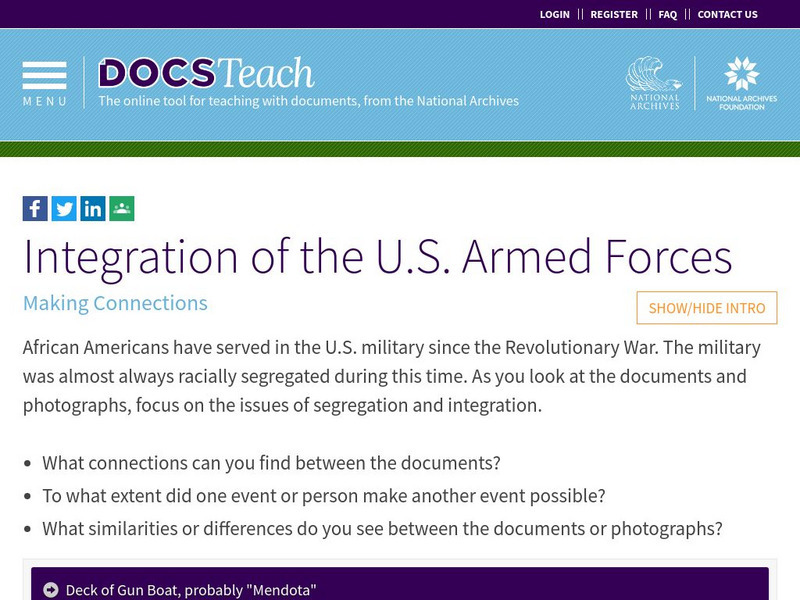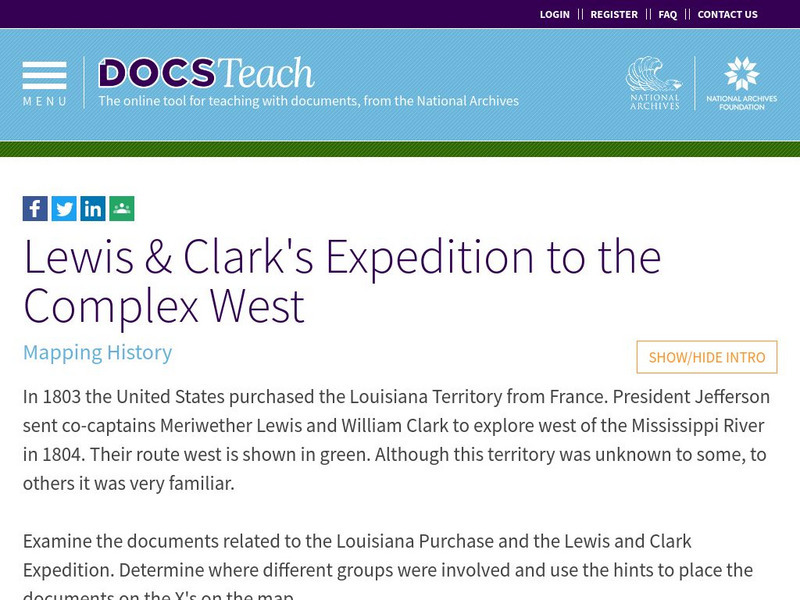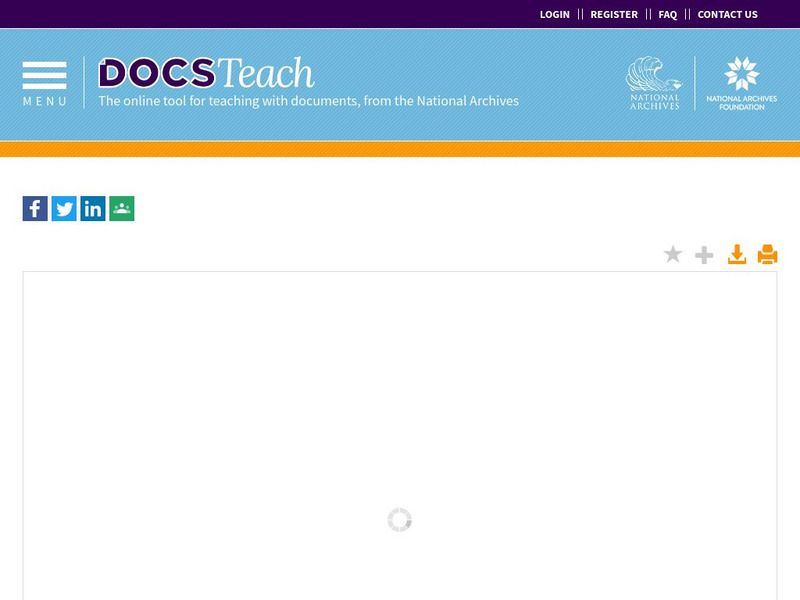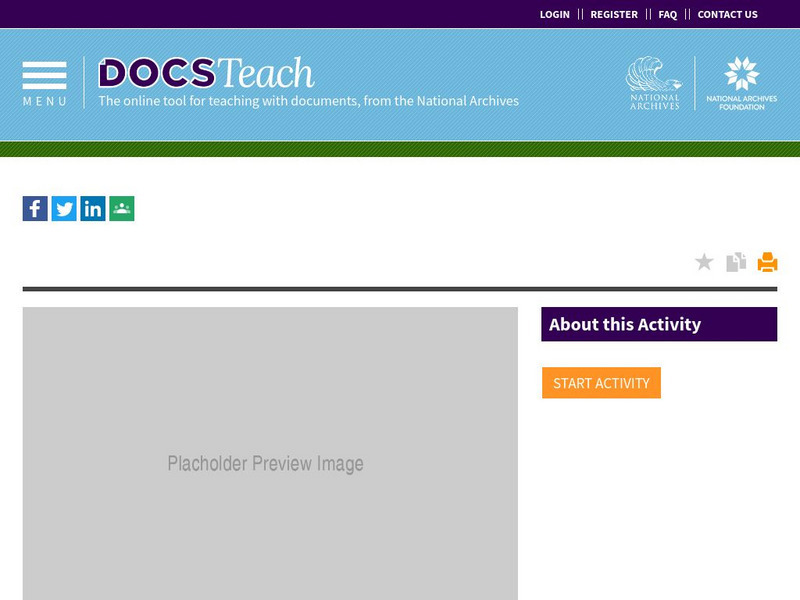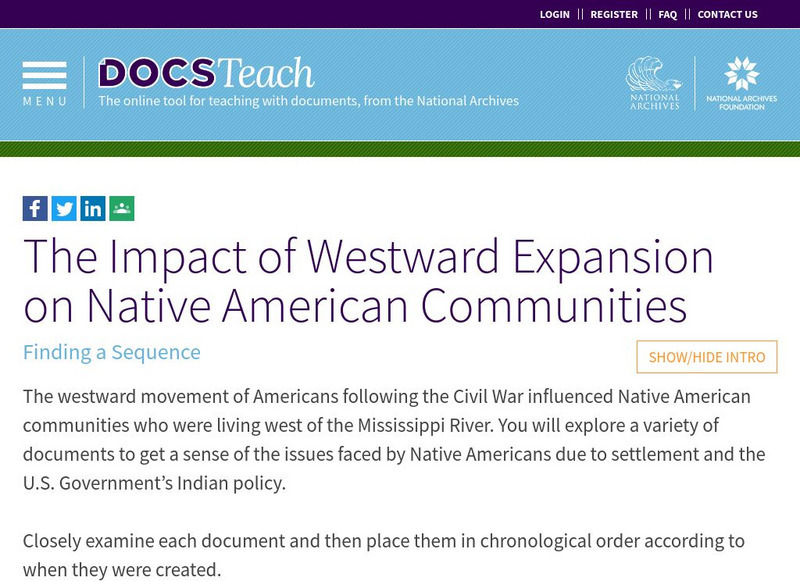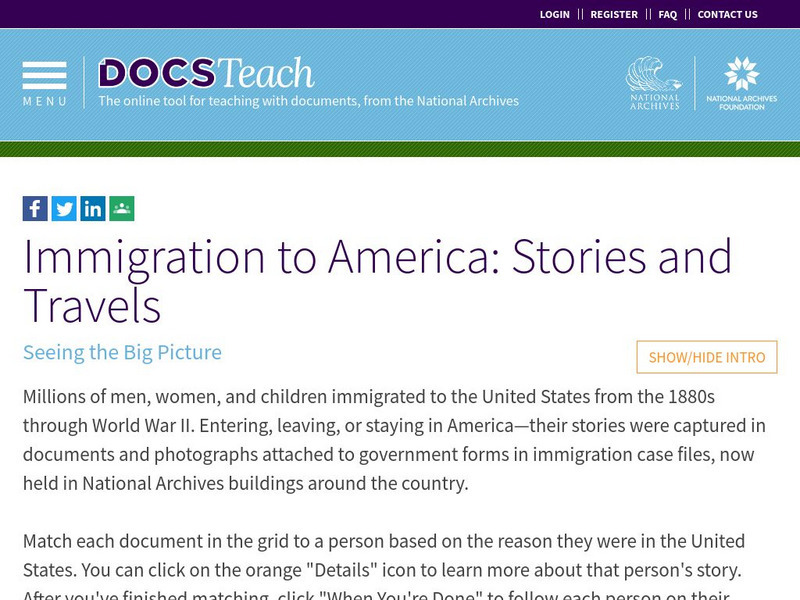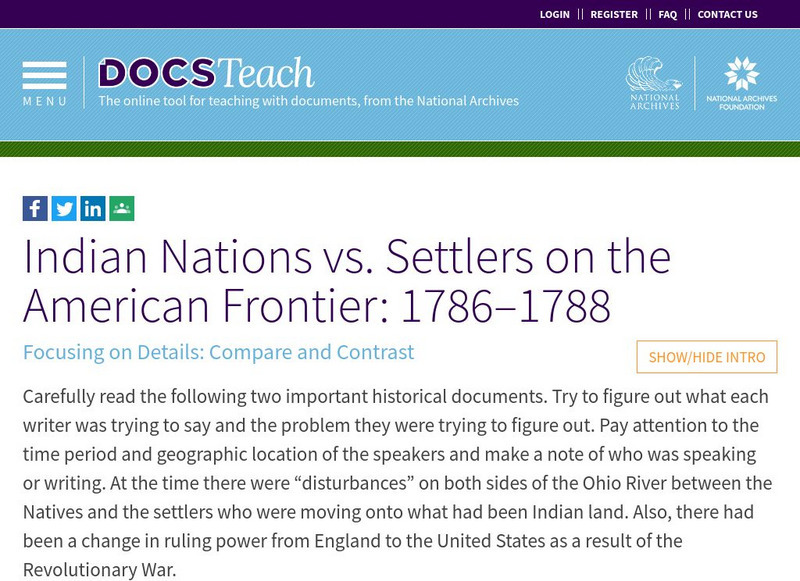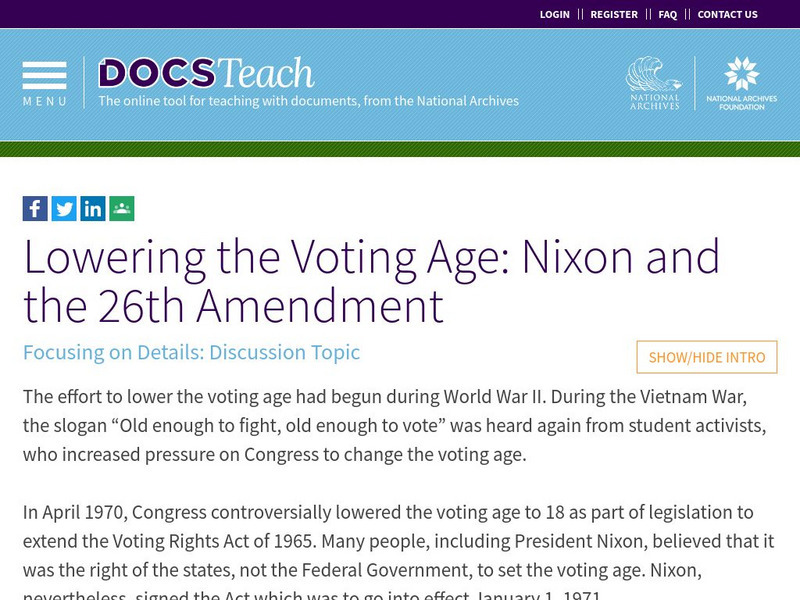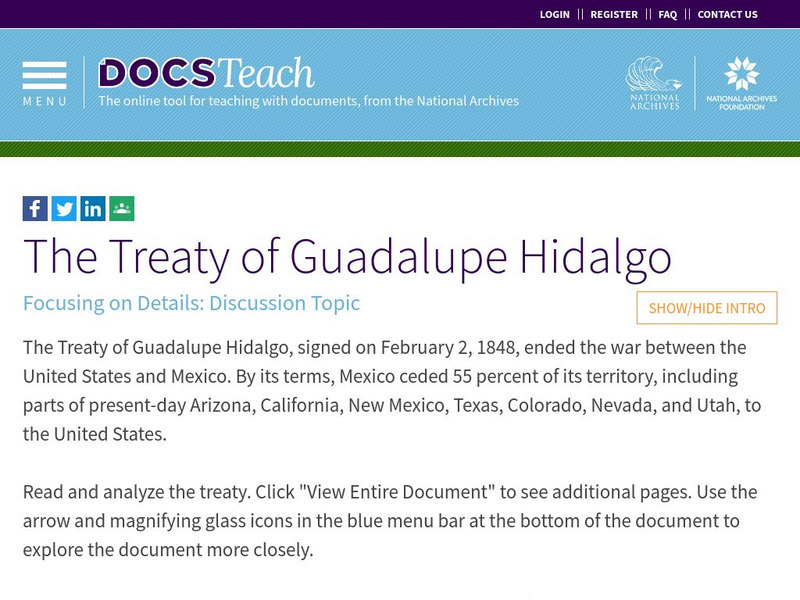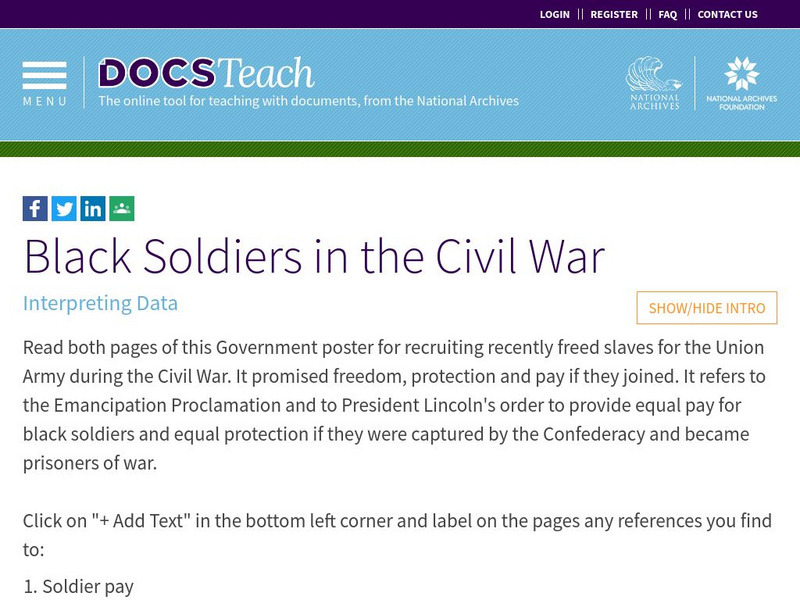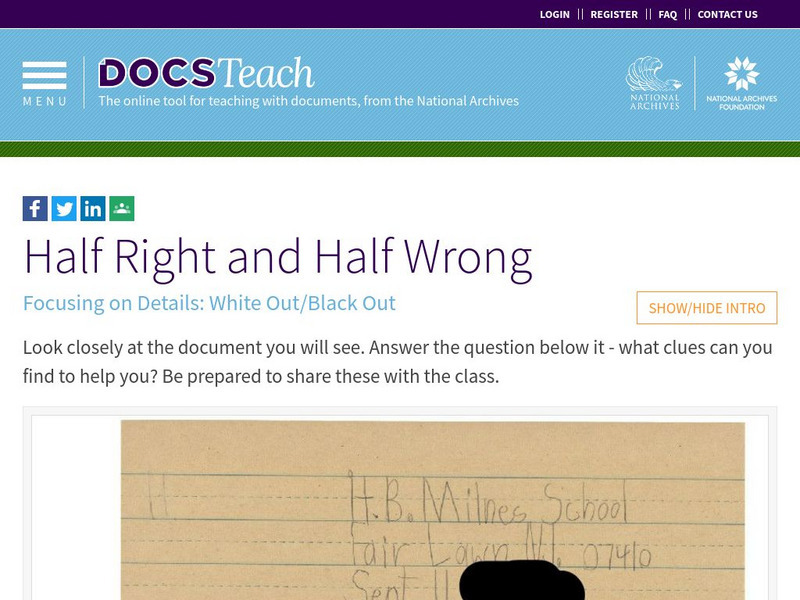US National Archives
Docsteach: The Constitution at Work
In this activity students will analyze documents that span the course of American history to determine their connection to the U.S. Constitution. Students will then make connections between the documents they have examined and the big...
US National Archives
Docsteach: The Civil War as Photographed by Mathew Brady
Learners will analyze a series of photographs taken by renowned photographer Mathew Brady to reflect on the lives of soldiers during the Civil War. The holdings of the National Archives include over 6,000 photographs taken by Brady and...
US National Archives
Docsteach: Integration of the u.s. Armed Forces
Middle schoolers will draw upon the visual and textual data presented in photographs and documents to gain an understanding of the participation of African Americans in the U.S. Armed Forces and of changes in American military policy...
US National Archives
Docsteach: A Revolution, a Reaction and a Reform: National History Day
Students will analyze primary source documents related to the National History Day (NHD) theme for 2011-12: Revolution, Reaction, Reform in History, determine how the documents are connected to the theme, and evaluate the effectiveness...
US National Archives
Docsteach: Extending Suffrage to Women
In this activity, students will analyze documents pertaining to the women's suffrage movement as it intensified following passage of the 15th Amendment that guaranteed the right to vote for African American males. Documents were chosen...
US National Archives
Docsteach: Lewis & Clark's Expedition to the Complex West
This activity can be used as an introduction or for a closer study of the Lewis & Clark Expedition. Students will learn that the United States purchased the Louisiana Territory in 1803 and President Thomas Jefferson sent Lewis and...
US National Archives
Docsteach: From Dred Scott to Civil Rights Act of 1875: Eighteen Years of Change
In 1857, the U.S. Supreme Court ruled in the Dred Scott decision that African-Americans were not citizens of the United States. Yet within 18 years, Black Americans would not only have citizenship, but would be guaranteed the right to...
US National Archives
Docs Teach: President Reagan and the Cold War: Vision and Diplomacy
See how Ronald Reagan's rhetoric evolved from his speech calling the Soviet Union an "evil empire" to his signing of the Intermediate-Range Nuclear Forces Treaty by examining photographs and documents.
US National Archives
Docsteach: The Voting Record of the Constitution
In this activity, learners will analyze a primary source document to find relevant historical data and measure the degree of agreement and disagreement during the Constitutional Convention.
US National Archives
Docsteach: Watching What?
Students will hypothesize what the president and cabinet members were watching on television by analyzing facial expressions, and body language, and the physical environment. Students will learn that President Ronald Reagan and his staff...
US National Archives
Docsteach: The Big Ideas of the u.s. Constitution
In this activity learners will identify and define seven key ideas contained in the U.S. Constitution by making matches from the grid. They will then analyze documents that demonstrate each big idea in action.
US National Archives
Docsteach: Reasons for Westward Expansion
Students will examine a variety of documents that reference reasons why Americans living in the East migrated west of the Mississippi immediately before, during, and right after the Civil War. Documents cover the mining industry, new...
US National Archives
Docsteach: The Impact of Westward Expansion on Native American Groups
In this activity, students will examine the impact of westward expansion and settlement on Native American groups following the Civil War. Students will explore a variety of documents to get a sense of the issues faced by Native...
US National Archives
Docsteach: Immigration to America: Stories and Travels
This activity asks students to match documents to individuals based on the reasons these people came to and were living in the United States. The photographs and documents are attached to government forms in some of the millions of...
US National Archives
Docsteach: A Call to Action: Responses to Civil Rights Violations
In this activity, learners will be introduced to the civil right activities of Harry T. Moore, former schoolteacher and National Association for the Advancement of Colored People (NAACP) official in Florida in the 1940s, and analyze the...
US National Archives
Docsteach: Indian Nations vs. Settlers on the American Frontier: 1786 1788
For this activity, students will compare and contrast two documents from the Revolutionary period written by 1) a combined group of Native American tribes and 2) an American territorial governor, Arthur St. Clair. Students will analyze...
US National Archives
Docsteach: Landing a Man on the Moon: President Nixon and the Apollo Program
This activity chronicles the Space Race from President Kennedy's call to land on the Moon until Apollo 17 - the last lunar Mission, placing particular emphasis on President Nixon's role in the space program.
US National Archives
Docsteach: Lowering the Voting Age: Nixon and the 26th Amendment
This activity encourages students to think critically about the history and importance of the 26th Amendment, that granted the right to vote to American citizens aged eighteen or older.
US National Archives
Docsteach: Civil Rights Act, 1964 & Equal Employment Opportunity Commission
This activity asks students to read, analyze, and summarize Title VII of the Civil Rights Act of 1964 that established the Equal Employment Opportunity Commission.
US National Archives
Docsteach: Analyzing a Letter to Congress About Bloody Sunday
In this activity, students will focus on a letter written to Congress about Bloody Sunday in Selma, Alabama. Students will determine that, due to television coverage, the author, Mrs. Jackson, was very aware of the events that day even...
US National Archives
Docsteach: The Treaty of Guadalupe Hidalgo
The Treaty of Guadalupe Hidalgo, which brought an official end to the Mexican-American War, was signed on February 2, 1848. This activity asks students to read and analyze the treaty to explain the overall message and tone.
US National Archives
Docsteach: Black Soldiers in the Civil War
In this activity students will analyze a two-page poster that the Government used to recruit recently freed slaves to fight for the Union Army during the Civil War. The poster refers to the Emancipation Proclamation and to President...
US National Archives
Docsteach: Documenting Key Presidential Decisions
In this activity, students will identify and analyze documents related to key presidential decisions. Through close examination of the documents, students will determine which president was involved. Students will then identify the...
US National Archives
Docsteach: Half Right, Half Wrong: Analyzing a Letter About Ford Pardoning Nixon
For this activity, students will analyze a document sent from a child to President Gerald Ford in 1974. Anthony Ferreira wrote to the president to express his opinion regarding the pardon of Richard Nixon.




